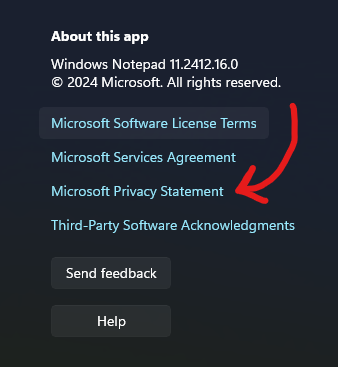Thanks everyone for your active participation here. We knew this would have a lot of interest and so we’ve waited to dive into the conversation because we see some themes emerging that I’ll respond to broadly here. The main concerns I’m noting are around the license agreements we declare, our use of data for AI, and our Acceptable Use Policy. Below are a few clarifications to each of these areas.
Switched to Waterfox right away. There are other forks i’ll consider if waterfox also tries to pull the AI uno card as well. Chromium crap is out of question because of manifest 3
i guess its finally it.
So, how painless is the transition from heavily customized and extended Firefox Developer Edition to Waterfox? Do I lose CSS support for multi-row tabs or compatibility with any extensions attained from the Mozilla store?
I already don’t maintain a Mozilla account or use any form of syncing, so “losing” that won’t matter.
Waterfox has mozilla sync
February 19, 2025.
As I have said many times over the last few years, Mozilla is entering a new chapter—one where we need to both defend what is good about the web and steer the technology and business models of the AI era in a better direction.
https://blog.mozilla.org/en/mozilla/mozilla-leadership-growth-planning-updates/
Apparently there is new era.
I feel for Ashley here. She likely had no say in the matter and is being tasked to defend this change.
There is only one way to fix this short term which is to roll back the TOS.
Long term would be to guarantee to keep the MPL as the governing license for both the source code and executable.
Acceptable solution would be severely limit the license users would have to give to Mozilla, both time bound and use bound.
you hereby grant us a
nonexclusive, royalty-free, worldwidelimited, royalty-free license, used for the duration explicitly necessary to allow Firefoxto use that information to help younavigate, experience, and interact with online content as you indicatewith your use of Firefox, not to exceed execution duration of the browser, or one day, whichever is shorter.But again, absolutely no license should be necessary. The browser is not a legal entity and I should not need to give Mozilla a license for my data.
I feel for all the dollars that will get wet with her tears as she wipes her eyes with them.
The ToS hasn’t gone into effect yet, so it would be postponing rather than rolling back. One thing that hasn’t been answered yet, though, is why this change is needed now - possibly, there’s a legal reason why postponing isn’t an option?
We. Don’t. Want. AI.
Great, what other good Gecko Engine Browsers are there?
Waterfox is the safe bet, it’s basically just regular Firefox repacked with better defaults and telemetry turned off, but it isn’t harden or has add-ons included.
LibreWolf is what I switched to over a year ago, The team behind it have been pretty thorough in scraping out spyware and it comes pre-hardened out the box (but that can break more invasive websites).
They’re opt-in by default, it’s not like they’re forcing AI on you.
Even the mere existence of AI which usage is opt-in is a so called slippery slope.
Not really. Other companies forced AI to appeal to investors and look for new ways to trap consumers in subscriptions. Mozilla added free, privacy-friendly addons because people asked for it. Big difference.
We’re already seeing other companies shoehorn in chatbots into everything to try to make up for the fact that the trend didn’t really catch on.
… yet
idk why people are downvoting, it’s exactly what has happened with literally every bad policy online anywhere. They beta test it to gauge how bad backlash would be, then if it’s acceptable go ahead with it, if too much backlash just use the “oh it was just a beta! we would never do that 🥺” excuse then in 6 months try again
Edit: the Lemmy hive mind has reversed their decision. It was at +4 | -4 when I replied
Because they said multiple times they don’t plan on making it a default. From the very beginning Mozilla announced their AI extensions will not be forced on people. I don’t understand the “but what if they do” comments. “What if elon musk bought firefox?!??! It could happen!”
Also said “we will never share your data” and now they’ve removed that from the terms. I assume you’re aware that they just had a change in leadership? These decisions come from whichever is in charge. New leadership might still agree enough with it to not change it, but what about the person after, or the one after that? As they say “never is a very long time”.
I’m also not saying it will definitely happen, but my confidence in it not happening is now low enough that I switched to LibreWolf.
zen, i guess
Zen is not another browser, it is just reskinned firefox with some tweaks.
Well that’s kind of all any gecko based browser can ever be. The way gecko’s written, it’s a lot more locked into the rest of firefox than Chromium’s web engine
Too recent to trust, I feel like. Have you been using it? What do you make of it?
i haven’t. i use hardened firefox
Orion
Last I checked it was webkit based, did they change it?
Hmm, not that I know of.
“It does NOT give us ownership of your data”
Then why did it say that it does?
“When you upload or input information through Firefox, you hereby grant us a nonexclusive, royalty-free, worldwide license to use that information to help you navigate, experience, and interact with online content as you indicate with your use of Firefox.”
If we insist on having terms at all, then GOOD and user-respecting terms are ones which list clearly, precisely and exhaustively exactly what data will be used for what purpose under what circumstance.
BAD and corporate-favouring terms are ones which make broad, sweeping statements which can be interpreted any way the company likes in their favour - and where changes to how and what data is shared and transmitted can be made any time without updating the terms, because the terms are so broad they cover just about anything.
Pretty clear which one of those things the new terms are.
This is exactly why I don’t believe a single word they say about this new TOS.
Their MPL2 was perfectly fine. Moving their executable to a proprietary license with less freedoms was not going to go well.
Uhh, because without letting Firefox use the information you type, you would have a very shitty word processor instead of a web browser?
Imaging typing “www.google.com” and Firefox just sits there because without your permission to use the data you gave it, Firefox would ethically not be able send that text to a DNS server.
That’s what that means.
When you interact with your web browser as an application, the information you put into it - including any DNS queries or submitted data - is routed between your ISP, your DNS provider, and the provider of the website. And for non-mozilla websites then none of those are Mozilla.
“Firefox” as a browser sees that stuff, but “Mozilla” as an organisation, a busineas entity, does not need to see that.
Exactly the same that when you buy a bicycle you can ride it anywhere you like without the company who made the bike knowing where you are - sure they made the bike, but after that point, the relationship is over.
This is why historically there has not been any need to accept terms for a browser, because a browser is just a vehicle - what you use the browser for has actually no dependency with the company who made it.
A policy only starts to become necessary when the browser positions itself as an entity that you transact with directly; like creating an account to sync data with Mozilla services and store things in pocket, or to interact with AI services which Mozilla provides.
Effectively, mozilla have now started adding extra features to the bicycle which are useful but also need to communicate with Bike HQ to work. And they are being a little less than specific about what data that is or what they will do with it.
That’s what data usage policies are about - what data does Mozilla as an organisation collect, what do they use it for, and what third parties do they interact with to provide those services. And that’s what I’d hope to see, rather than a broad statement that in theory allows anything.
That’s the thing: you do interact with the web browser. It’s literally the first thing that has to happen before accessing the Internet.
You don’t type directly into Facebook; you don’t search Google directly. You type into a text box in web page rendered by your browser. Your browser handles the HTTPS encryption as well as sending everything you type to the next layer in the network stack. That’s what Mozilla’s policy is clarifying- the very act of typing data into Firefox means you’re giving data to Firefox, so they’re telling you what happens to that data when you do (which is not “send it to Mozilla”).
That’s what Mozilla’s response to the recent criticism tried to explain this as being, but that response itself is to me not at all plausible.
You do not need to give Firefox or Mozilla permission to “do” anything when you simply navigate to a website or perform a search, because the only entities involved in that transaction are yourself, your ISP and the website. NOT Mozilla.
To be super clear here: Yes, Firefox as an installed application has complete and total access and permission on anything you ever do or say or send, and always has done since day 1. And that is absolutely fine, because that data did not go back to Mozilla.
That’s how its been with web browsers since the web browser was invented - you don’t have to agree to let the browser do things for you, because just like a bike you are the one driving the browser and deciding where it goes and what requests the broswer makes when you drive it - you are in control.
The new terms and conditions have been added to cover data which is sent back from the browser to Mozilla, or to other partner services.
Your previous response couldn’t be more clear. At this point this guy is just trolling, and it’s never a good idea to feed trolls.
You do not need to give Firefox or Mozilla permission to “do” anything when you simply navigate to a website or perform a search, because the only entities involved in that transaction are yourself, your ISP and the website. NOT Mozilla.
Again, as I’ve already pointed out this is not correct. You don’t interact with websites directly; you interact with them through your web browser.
To be super clear here: Yes, Firefox as an installed application has complete and total access and permission on anything you ever do or say or send, and always has done since day 1. And that is absolutely fine, because that data did not go back to Mozilla.
Except you don’t know that. You can’t say what expectations you might have had with whatever data you provided because there was no policy published to say what Mozilla might have done with it. Now, there is.
You need to understand that what you wrote is utter bullshit and not how any of this works, or has ever worked.
Mozilla is not the software running on your computer and you having some sort of agreement with them is not even slightly required for the software running locally to connect to the third-party server that you, the user, directed it to connect to.
Adding Mozilla ToS to Firefox is like putting “vegan” labels on tomatoes: it’s not just pointless, but also suspicious.
It’s suspicious, because you think those tomatoes have dairy or meat in them?
Maybe Beefsteak tomatoes?
Hmmm. How about no other program has ever required this? A program is not the company. I do not need to give away my right to my data to use a telephone or send a postcard.
Seems weird. Should the linux kernel be getting my permission to send what I type from the keyboard to Firefox? What about when the kernel sends what firefox does through my wifi card? It gets silly real quick.
It gets silly real quick.
is this your first interaction with lawyers?
hahaha
Seems weird. Should the linux kernel be getting my permission to send what I type from the keyboard to Firefox? What about when the kernel sends what firefox does through my wifi card? It gets silly real quick.
Should they not? Do you want everything you type on your computer, even stuff that’s not meant to be seen publicly, to be sent somewhere without your knowledge?
A few months ago everyone was in an uproar because Microsoft wanted to do that very thing with Windows Recall. Why is that idea preposterous just because Firefox is telling you about it?
Should that license then also clarify that the kernel will not clean my dishes for me?
Not having some feature/behaviour doesn’t need a license. A license, a form of contract, is only necessary when two or more parties interact. I interact with Mozilla when I download and install Firefox, so I have to conform to some distribution license for example. Maybe they restrict me from redistributing the binary they provide me (made-up example). But after that, I no longer interact with Mozilla, so anything I do with Firefox should not require a license.
Should that license then also clarify that the kernel will not clean my dishes for me?
Of course it should. It should also clarify that you’ll only get a blowjob on your birthday and you’ll have to do your own taxes, you deeply unserious person. 🙄
So for the last 20 plus years before this new wording, Firefox has not been a functional browser?
That’s not what I said. But making a policy explicit rather than implicit seems to me like a good move for privacy. Isn’t it better to know exactly what Firefox is doing with what you type, rather than just assuming?
If they make it more exact such that it’s not ambiguous whether they can use our data for whatever, that would be fine.
I agree, and so does Mozilla. From the linked blog post:
Regarding our position around licensing, we need a license to allow us to make some of the basic functionality of Firefox possible. Without it, we couldn’t use the words you type into Firefox to perform your searches, for example. It does NOT give us ownership of your data or a right to use it for anything other than what is described in the Privacy Notice. We’ve added this note to our blog to clarify, so thank you for your feedback.
Here’s the Privacy Notice referenced above. While I agree with you that they are vague about their “Partners, service providers, suppliers and contractors” they supply data to (read: Google) they do provide ways for you to request that data.
Does Notepad need a license to interpret your keystrokes and save them to a file? Interpreting my keystrokes and formatting them as an HTTP request to the search engine should not require any online service, and if the data does not leave my machine, it doesn’t need a license nor privacy policy. They have done just fine without a license for decades, because it would be absurd to require a license for fully local operations.
Does Notepad need a license to interpret your keystrokes and save them to a file?
Oh look at that, a privacy policy in Notepad that tells you how Microsoft uses the data you type into Notepad.

Interpreting my keystrokes and formatting them as an HTTP request to the search engine should not require any online service
It doesn’t. The policy covers what happens after that. Sure, open up Firefox and type whatever you want in the address bar and you can be as private as you want. The second you press Enter is when Firefox does stuff with what you typed, and Mozilla is saying that when you push Enter you give them permission to do that stuff. You’re giving Mozilla permission to send your search to Google for midget porn, or to post your pro-Trump rant to Facebook, or email your great-Grandma’s secret oatmeal raisin cookie recipe to your ex-wife.
It’s turning an implicit use of a web browser (“Of course we’re sending your search to Google and nowhere else wink”) into an explicit use (“When you provide data to Firefox, we’re gonna do this with it, cool?”)
@billiam0202 in this age of data pillaging to fuel AI models and target ads, people rightfully assume the worst. If that’s Firefox’s intention then better wording is required.
K. In that case, explicitly guarantee it in your terms and conditions.

It’s clear now that they don’t care, and they will use whatever we type to train their AI.
That’s the end of Firefox for me, it’s disgusting that they don’t care about privacy anymore.
Thank god for forks
What are some of the forks?
Well you got the cheese fork, oyster fork, crab fork, spaghetti fork, dessert fork, Neptune’s fork, carving fork, fish fork, table fork and the fork in the road that leads you to Librewolf, waterfox, pale moon, I just learned about Floorp today. I haven’t switched desktop yet, (this weekend project), but I switched my phone over to Ironfox and so far its all good.
+1 for Waterfox! Water beats fire.
They haven’t cared for a long time.
How are y’all feeling about icecat?

















